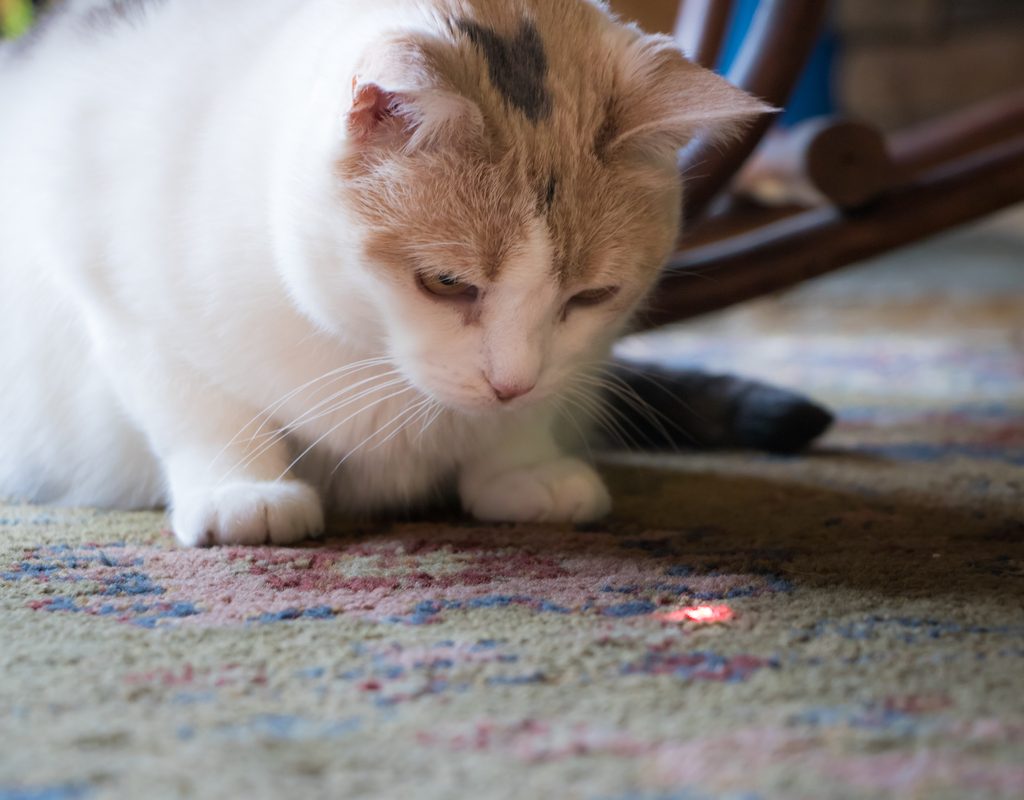Do you play laser tag with your cat? Then you’ve most likely spent hours watching your fur baby’s frantic scrambling after her nemesis — a tiny red dot. While it’s entertaining to watch your usually cool, calm, and collected cat race through your house after the laser beam, there are a few things you should be aware of during playtime. Why do cats chase lasers? And should you play with your cat using a laser pointer? We’ve consulted the experts, and here’s what they have to say.

Why do cats love lasers?
Laser dots are colorful, vivid, and most importantly, they’re unpredictable and constantly in motion. If you watch a laser pointer, it almost seems to be alive because of the light’s vibrations and the movement of the pointer. There’s no predicting which way the laser will move, and when it does move, it can move rapidly.
All of those qualities resemble the actions of the prey animals that your cat would hunt in the wild. According to Vet Street and Dr. Gary Landsberg of the North Toronto Animal Clinic, this resemblance to prey is particularly intriguing to cats. In fact, during a single day, your cat would naturally chase and possibly kill his prey eight to 10 times.
That’s a lot of hunting and pouncing, and just because your cat doesn’t depend on his hunting instincts to feed himself in your home doesn’t mean those instincts are gone. In fact, when you bring out the laser pointer, your cat may be reconnecting with his inner hunter, and then the chase is on.

Are laser pointers good for cats?
Laser pointers mimic your cat’s prey, including mice, bugs, and small birds. As a result, chasing a laser can help to satisfy your cat’s natural prey drive. This play gives your cat valuable physical exercise, and it can also help to prevent boredom.
But that doesn’t mean that laser pointers can’t be bad for cats. Used incorrectly, laser pointers can be dangerous and even potentially lead to injuries, especially if your cat is super enthusiastic when he plays with them.
The good news is that you play an important role in keeping your cat safe during these play sessions, and you can use laser pointers carefully to maximize your cat’s safety. PetMD recommends that you introduce the laser pointer gradually, especially if your cat is unfit and doesn’t often play. Start with short play sessions and then end them early to give your cat a little bit of exercise without getting him too tired or sore.
You’ve no doubt heard to never aim a laser pointer at anyone’s eyes, and that’s just as true for animals. Also remember that wherever you point the laser, your cat is likely to end up in that spot seconds later, so think carefully about how you’re using the laser. Avoid shining it on the top of stairwells, on bookshelves, up high against walls, and in any other area that could cause your cat to fall or otherwise be injured during his pursuit.
If you have multiple cats in your home, you’ll need to either have them in separate rooms or have multiple lasers to keep everyone safe during playtime. Enlist a family member’s help to handle the extra lasers, and let each cat lock onto a laser. Then, direct the lasers in opposite directions so the cats don’t collide with each other as they play.
When you use lasers appropriately, you will give your cat valuable exercise and potentially help him lose weight. Playing with a laser can help your cat feel more confident, and it might be the perfect way to help a new cat come out of his shell and explore his new home.

Tips for successful laser playtime
While most cats will be naturally intrigued by lasers and are more than happy to play with them, it’s important to keep your cat entertained and satisfied. Make sure that you let your cat “catch” the laser every now and then, just like he’d catch prey. That principle applies to any toy that your cat is playing with — if you don’t let your cat catch the toy now and again, he may get frustrated and not want to play at all.
There are tons of fun cat toys on the market, and you might go through dozens of them before you find one that your cat actually adores. Lasers, however, are super appealing to most cats. The small, handheld types are easy to use and compact, so you can tuck them away into a drawer or cabinet between play sessions.
With the ability to give your cat plenty of exercise, satisfy his natural prey instinct, and help keep him entertained, a laser pointer just might be the best cat toy you could ever buy — and possibly the one your cat enjoys more than the box it came in!



